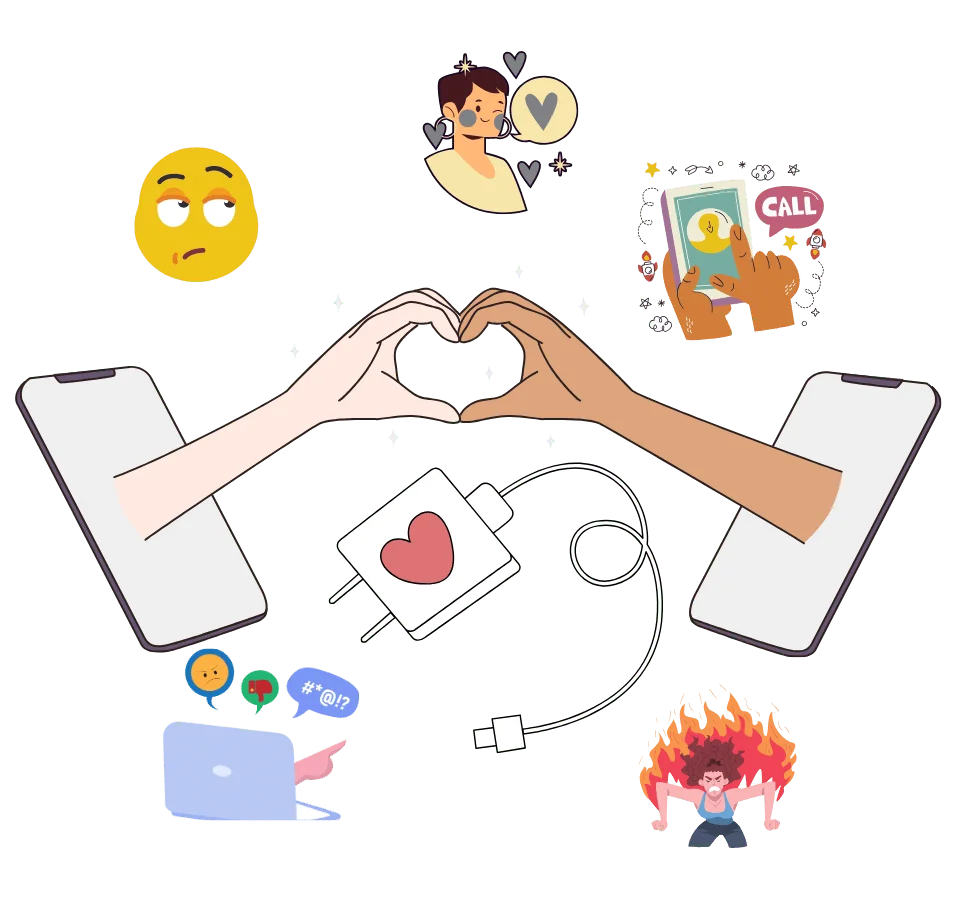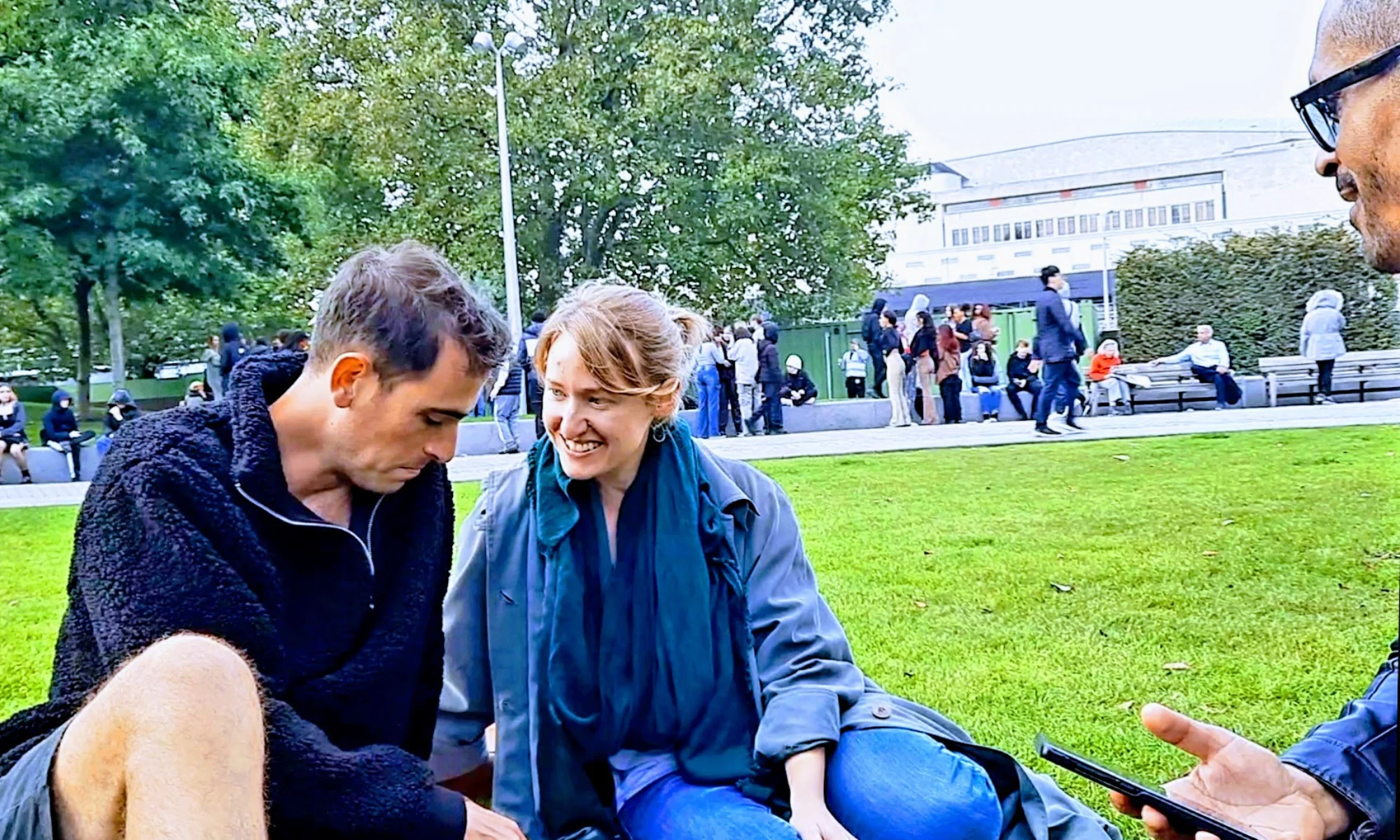Love for Sale: How Dating Apps Manipulate Users, Exploit Loneliness, and Profit from Heartbreak
Written by : Linno Freyre
About the Author
Linno is a tech professional turned podcaster, entrepreneur, life coach, and author dedicated to helping people become the CEO of their lives through habits, discipline, and relationships. His approach blends journaling, planning, and creative self-discovery, inspiring others to break free from settling for less. His book, Self-Control: Who's Running the Show?, offers a unique guide to mastering habits and taking control of your life by harnessing the five energies (spiritual, mental, physical, emotional, and business).
LEARN MORE ABOUT LINNO
Dating apps were supposed to make dating a breeze, right?
Swipe, match, fall in love. Live happy forever! But here we are—millions of us stuck in an endless cycle of swiping with little to show for it. Are you one of them?
There is no doubt that dating feels harder than ever these days. You’d think that it would be a piece of cake with all the dating apps out there, like Tinder, Hinge, and OkCupid, which are pretty much all owned by Match Group.
I remember a conversation with my mom about her experiences with courtship in Cape Verde. While there were some crazy customs, such as kidnapping a woman in the street, taking her home and making her your wife immediately, for the most part, courtship was easier and more romantic. Men would dedicate time to this process, often going to church on Sundays, smiling at each other, and walking together in the market.
In a world with nearly 8 billion people and big cities like London packed with potential dates, why does it feel so impossible to find someone?
I am part of a few single group chats, and many people share a familiar feeling: frustration. The daily and weekly struggles they face, often due to a lack of understanding and experience, are relatable.
One big problem is turning meaningless chats into real connections even after daily chatting for hours. We’ve been there, chatting for weeks and then, poof. It happened to me, and I have done it myself many times, I confess. But there is more to it, so let’s begin.
The Truth About Dating Apps: Why They’re Rigged and How to Beat the System
Why Dating Feels So Hard Right Now?
Dating apps promise love at your fingertips, but a lot of users end up stuck in a never-ending cycle of swiping with nothing to show for it.
Isn’t it funny that the Bumble founder met her husband while skiing, not through a dating app?
Studies show that these platforms focus more on keeping you hooked than improving your love life. To me, it is a simple idea to understand. Their main product is you.
It is not a surprise if they care more about making money than helping you foster genuine relationships.
Just go on Reddit or chats and read people’s stories about burnout, dissatisfaction, and even mental health issues.
Let’s face it, dating apps feel more like gambling machines than tools for meaningful connections.
In this article, I’ll dive into how Match Group operates, the lawsuits they’re dealing with, and what it all means for our mental health and relationships, especially in promoting hookup culture.
I’ll also take a look at the people running these services and suggest some ways to break free from the cycle.
Plus, I’ll share my own experiences—both the highs and lows—of using these apps and how to make the most of them, no matter what they really are. I think there is hope, so read on.
The big question is: Dating apps promise love at your fingertips—so why does it feel like a dead-end slog?
- Dating app fatigue is real. A Forbes Health survey found that 78% of users feel burned out by dating apps.
- In the UK, 46% of online daters report negative experiences, from ghosting to meaningless small talk.
- The “hookup culture” is normalised, “leaving many people stuck in surface-level relations while craving something real.

The Business Model: Addiction Over Connection
If you haven’t heard of it, Match Group is a public company that runs over 45 dating brands used by millions worldwide. Basically, they control the online dating market, and their main goal is to keep you hooked, not necessarily to help you find love.
You may say, but Linno, this doesn’t make sense. The company actually helps. Allow me to explain.
Are Dating Apps Trapping You?

How many do you know who are really happy with dating apps and have had a great experience with them? I am not saying there aren’t. I am one of them who got good results – more on this later – however, most people are frustrated with them.
Now, think about it; what if everyone found their perfect Match and bounced after just one swipe?
Those companies would be in big trouble.
So, yeah, they need to keep you hooked without necessarily guaranteeing quick success.
What is clear to me is that dating apps are designed to keep you coming back—it’s baked into their business model. Most of them (think Tinder, Hinge, and Bumble) rely on a mix of user engagement and revenue from subscriptions, boosts, or premium features.
They use some pretty clever strategies to keep you coming back:
- Gamification (The Dopamine Hit): The whole swiping feature works much like slot machines. The trick behind it is that it gives you little dopamine rushes that make you want to keep playing. The same way “likes” or views on social media do.
Swiping feels like a game! Each Match triggers a Here’s reward in your brain, keeping you scrolling for the next one.
You quickly become fussy, catching any tiny detail to make a swipe left.
It becomes less about finding “your person” and more about chasing that buzz – even if you don’t realise it. - Algorithmic Manipulation:
Apps often prioritise “engagement” over compatibility. Ever notice how you see the same faces or get pushed to buy a boost? They’re nudging you to stay active (and spend more).
These apps hold back on showing you too many potential matches. They offer just enough to keep you engaged but not enough to actually help you find love. Every time I create a profile on Tinder or POF, during the first 24 hours, I have more than 30 matches. Of course, they’re all blurred, and I need to pay to see them. How often do you hear people say this is a trick to lure you into a subscription? - Infinite Options (This is huge): They flood you with new profiles to create a paradox of choice. Have you heard about this? Too many options can make you second-guess, hesitate, and keep swiping instead of committing to a date.That’s why Apple limits the number of options for their products.The funny thing is that when I was using Hinge, even though I was very conscious about this strategy, I found myself cancelling dates because, eh, you know, the next refresh will bring more! I had options to choose.
I am a man; now imagine what this does to women who typically have tons of matches. Some of them, whom I went on a date with, confessed that it is very stressful waking up to a ton of messages every day, and they need to filter out. It becomes a chore! - Premium (FOMO Features): Things like boosted profiles and unlimited likes tap into your insecurities, making you feel like you should pay up for better chances.
Time-limited matches (e.g., Bumble’s 24-hour reply window or Hinge’s stand out) or “see who likes you” play on the fear of missing out, pulling you back in.
These design tricks lead to compulsive behaviour, as users constantly chase that next thrill but often feel unsatisfied. The algorithms control what you see, showing just enough matches to keep you hooked but not enough to actually meet your relationship goals, ensuring you stick around on the app longer.
Premium features like boosted profiles or unlimited likes are often pitched as ways to improve your chances of matching. But really, they’re just preying on people’s insecurities, making them feel like they have to spend more to get better results.
A study from 2021 showed how these features create a “pay-to-play” cycle, where users, especially men, feel pressured to shell out more cash for a better experience. (10 UI/UX Design Tips for Dating Apps [with Examples] | KeyUA).
This lines up with claims in a 2024 class action lawsuit that Match Group’s apps are designed to be addictive, which goes against their “designed to be deleted” motto. (Tinder, other Match dating apps encourage compulsive use, lawsuit claims | Reuters).
Some might say it’s just how business works and that they need to make money, and sure, that’s true. But the point here is to help you understand what you’re up against and give you the info to make wise choices.
If you’re facing a problem, the first step to fixing it is to really grasp what you’re dealing with.
But now let’s look at some of the consequences the companies are facing.
The Faces Behind the Apps
Leadership and Values: A Contradictory Mission
The leadership at Match Group has always talked about its mission as “helping people find meaningful connections.” People say many things, but what matters is their actions, not their speech.
Behind the scenes, it’s clear that the main priority is making money for shareholders. I get that profit is the primary order of a business; indeed, if they provide a service, they should make money.
But you, as a savvy user, need to be aware of their tricks so you don’t fall for them.
Understand that these people didn’t create these apps with the ulterior goal of helping humanity connect; it’s the exact opposite. If you look at their stance, they are not promoting what usually leads to long-term fulfilment, such as stable relationships, family values or commitment.
Instead, they encourage short-term relationships, which can leave people feeling lonely, anxious, and struggling with their mental health.
Key players like Shar Dubey, the CEO until 2022, and her successor, Bernard Kim, promote their platforms as ways to connect. But really, the business model thrives on users being unhappy.
Gary Swidler, the CFO, openly talks about focusing on “monetisation” and “optimising user lifetime value ” This has led to features on apps like Tinder, such as “Super Likes” and “Boosts,” which some critics say take advantage of users’ fear of missing out (FOMO).
Sharmistha Dubey, the former CEO, claimed that dating apps could “bring more love to the world.” Nope! During her time, the company faced lawsuits for allegedly frustrating free users by pushing them towards subscriptions. Leaked documents showed they were even discussing ways to “engineer addiction” by using unpredictable matching systems.
Mandy Ginsberg, who stepped down in 2020, once called dating apps “a casino,” admitting they’re designed to be addictive but insisting that it’s what users actually want.
These leaders often say they’re just responding to use behaviour, but internal emails and court documents suggest they’re more focused on keeping users engaged at any cost, even if it leaves them feeling drained.
It’s not surprising, though. With their claimed commitment to user well-being clashing with a heavy focus on revenue, it makes sense that Tinder saw a 5% drop in direct revenue early in 2024 while trying to shift away from hookup culture. (Hookup culture worse than ever and killing dating apps, new research finds – Mirror Online).
The Silicon Valley Mindset: Growth at All Costs
Many dating app founders and execs come from the tech world, where shaking things up and getting tons of users matters more than values. One of Tinder’s co-founders, Sean Rad, once compared the app to a game, saying they viewed it as an experience similar to playing Scrabble.
And who are the ones being played? You! This laid-back attitude towards people really shows in the whole industry.
Another Tinder co-founder, Justin Mateen, made headlines in a 2014 interview when he shrugged off worries about Tinder’s casual vibe, saying, “We’re not trying to be a marriage factory.” Their early ads, like “It’s like real life, but better,” were clearly aimed at young folks looking for hookups, which helped the app blow up.
Markus Frind, the founder of Plenty of Fish, sold his app to Match Group for a whopping $575 million in 2015. He’s been pretty honest about how free dating apps thrive on “desperation,” saying, “The more desperate people are, the more money you make.”
Many creators dodge responsibility by claiming they just give people what they want. But when you listen closely, their words show a pretty transactional view of connections.
As Frind pointed out, “Dating is a numbers game… the more time you spend, the more ads you see.”
Where Are the Guardrails?
Dating apps navigate a tricky space when it comes to rules and regulations. While social media platforms are getting a lot of heat for their impact on mental health, dating apps have mainly managed to slip under the radar—until now.
The FTC’s 2023 lawsuit against Match Group claims that a whopping 80% of matches on Tinder and Hinge rely on “addictive” features instead of real compatibility.
Some former employees have spoken out about how the algorithms are designed to limit matches for free users, creating a sort of “survival of the fittest” vibe.
Also, internal documents from Hinge’s 2023 “Reset” campaign, which encouraged users to delete the app after finding love, showed some serious double standards. While they publicly promote “healthy” dating, Hinge’s parent company, Match Group, seems more focused on boosting metrics like “daily active users” than actually helping people find lasting relationships.
Despite claiming to have users’ best interests at heart, it’s pretty clear that the execs’ bonuses and stock options rely on increasing engagement, not on successful marriages or meaningful connections.
My Personal Journey: From Frustrated to Thriving on Dating Apps
I’ll be honest—I used not to understand why people use dating apps. I thought they were for people who didn’t know how to talk to people in real life—paying to talk to strangers? No thanks.
Over the years, I have created profiles on POF, Tinder, OkCupid, Bumble, etc. However, I got frustrated and deleted them after a few days. My problem was that I had no idea how to actually use online dating.
Even though I could meet people in real life, I was clueless about how to navigate dating apps.
Honestly, I didn’t care much because I was dating IRL; however, I didn’t like the feeling of having tried something and not succeeded at it. I couldn’t understand why many women would match me, and then nothing happened.
Finally, I decided to crack the code. I studied attraction, tested different approaches, and treated online dating as a skill.
The result?
✅ In just 10 months, I matched with nearly 400 people on Hinge only(without paying a single pound).
✅ I went on more dates than ever before.
✅ I learned precisely what works and what doesn’t.
This may sound easier than it is, but it didn’t come without initial frustration, trial and error, and training myself to take it as a learning process. People I coached often asked me about it, and it didn’t feel right not knowing precisely what I was talking about, so I had to put myself to the test.
One of the things I hear is, hey, you’re good-looking, so it’s easy for you.
Does Looks matter online? Yes, quite a bit. But that is just the starting point. It’s more about creating an attractive profile and then knowing how to text and date than looks. If looks were the main thing, I wouldn’t have had issues before.
Should you Ditch The Dating Apps?
Honestly, it’s not some big conspiracy—dating apps can help you find people if you know what you’re after.
Just think: smartphones are impressive pieces of tech, but many of us can’t go 30 minutes without checking them. Instead of letting them control our lives, let’s use them to improve our lives!
Yeah, dating apps are designed to keep you scrolling longer than you should. But here’s the trick: learn to cut through the noise! Make your profile stand out, tweak your match settings, and get out there for an actual date ASAP.
Don’t fall into that endless swiping trap; break free and go for genuine connections! Dating apps are just tools. If you don’t have a plan, you might feel drained, just like most people.
Solutions: Escaping the Dating App Trap
If you want to break free from that manipulative cycle, try getting out there and meeting people in real life. Joining hobby groups or attending community events can help you make genuine connections. Plus, therapy and counselling can really help with any mental health issues you might be facing, and places like Acenda Health can provide some great support and guidance.
(Are Dating Apps Bad for Your Mental Health? –).
Setting some real boundaries, like uninstalling apps or taking breaks, can really help cut down on compulsive use. Plus, getting into self-improvement activities can boost your confidence, so you won’t rely as much on what others think.
Alternative online communities, similar to interest-based forums, can help meet social needs without the pressure of dating.
To wrap up
If you feel caught in this endless loop, here are actionable steps to break free:
- Set Clear Intentions: Know exactly what you want before engaging with dating apps.
- Limit Your Usage: Allocate specific times for app use to avoid compulsive swiping.
- Engage Offline: Prioritise face-to-face social activities, hobbies, and community engagement to meet people organically.
- Seek Professional Guidance: Dating coaches or therapists can offer healthier dating strategies and help break addictive patterns.
Reclaim Your Dating Life
Dating apps were supposed to help us connect, but they’ve turned into money-making machines. It’s time to wake up to their tricks and regain control of your dating life.
Take a step back, rethink your approach, and focus on ways to build real connections that actually make you happy. Your love life deserves more than just being another number for Match Group’s profits.


